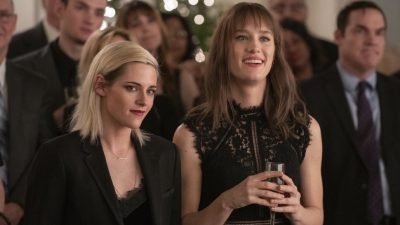

Filmed last January before the pandemic hit, Happiest Season is everything we need right now, in this different world we live in. It is a Christmas movie, it is loaded with clichés and tropes and worn-out jokes, but it still is something we’ve never seen before. It cannot be emphasized enough how one’s world can be shaped by popular culture, what we see, what we read, what we hear. And when you continue to not see yourself reflected in those places, it makes you start to feel like an outsider, someone who does not belong. In the long run, that makes an impact on your psyche, it drills deep down to the core, changing your basic chemistry. For gay kids, like me, there were no happy endings in television shows or movies for us when we were growing up. There were no light-hearted mainstream comedies for us to relate to and revel in. When you saw a queer character, the entire story was about that, and it always—always—ended painfully.
in this different world we live in. It is a Christmas movie, it is loaded with clichés and tropes and worn-out jokes, but it still is something we’ve never seen before. It cannot be emphasized enough how one’s world can be shaped by popular culture, what we see, what we read, what we hear. And when you continue to not see yourself reflected in those places, it makes you start to feel like an outsider, someone who does not belong. In the long run, that makes an impact on your psyche, it drills deep down to the core, changing your basic chemistry. For gay kids, like me, there were no happy endings in television shows or movies for us when we were growing up. There were no light-hearted mainstream comedies for us to relate to and revel in. When you saw a queer character, the entire story was about that, and it always—always—ended painfully.
So when I say that openly-gay actress/writer/director Clea Duvall has made a mainstream, commercial Christmas movie that shares every bit of its DNA with the classic family Christmas movies that have becomes staples in American homes, but the two main characters happen to be a gay couple in love, it is not only groundbreaking, but earth-shattering.
Happiest Season is as formulaic, sentimental, cheesy, and predictable as any movie can be. It is loaded with Dad jokes and see-it-coming-a-mile-away setups, and I loved every minute of it. Duvall, who co-wrote the film with Mary Holland (who also co-stars), clearly brought together a bunch of her friends to make a movie that they wanted to see, one that would make them laugh and one they could relate to. The result is a pure joy of a film that may not be perfect, but sure is wonderful.
Stewart plays Abby, who is in a happy relationship with her girlfriend Harper, played by Mackenzie Davis. When Harper invites Abby to come home with her to spend Christmas with her family, she neglects to tell Abby that she hasn’t yet come out to her family, who is upper-class and suburban, with political ambitions. Not quite the cross between The Birdcage and Get Out that it sounds like, it still presents quite a problem for Abby, as Harper asks her to play along until she gets the chance to tell them, which she insists will be very soon into their visit. But as Abby sees Harper become more and more enmeshed in family traditions and being the perfect cookie-cutter daughter her family expects, she realizes that Harper is not as ready to burst their bubble as she may have hoped. Hilarity obviously ensues, as Abby pretends to be Harper’s orphan roommate, and Harper’s family tries to set her up with her old high school boyfriend. Throw in the prototypical gay best friend, played by Dan Levy, and you’ve got gag setups for days of mistaken identities, gay people playing straight, and clueless parents treating their grown children like, well, children.
You have to force yourself to get past the surprisingly unimaginative and predictable plot, but, once you do, you will see an enjoyable, charming and funny movie packed with energy. I found myself laughing out loud several times and thoroughly enchanted by the performances. The whole film has a very Father of the Bride (Steve Martin version) vibe that I was totally digging. Mary Steenburgen is fantastic as the mother who wants everything to be perfect. Victor Garber plays the almost-too-perfect Dad with his usual panache, and Alison Brie and Mary Holland play Harper’s mismatched sisters, with Holland stealing every scene as the please-like-me sister who fights for her parents love and attention in the shadow of her more successful and adored siblings. Aubrey Plaza and Dan Levy are pitch-perfect as the ex and the gay best friend (of course).
As for Stewart, she wears her character very comfortably and seems at ease every moment, but Davis, unfortunately, feels quite the opposite. Besides the horrible hairstyle (or wig) that she must suffer through the whole movie, Davis’s performance feels forced and unnatural. I have adored Davis ever since her role in the criminally-underseen AMC series Halt and Catch Fire (it’s not too late to catch up if you missed it) and have been thrilled to see her career skyrocket the way it has, so it pains me to say this, but she just feels miscast. Not because she lacks the chops, but because there is just no chemistry with Stewart. You just never believe a moment of their relationship is authentic. Stewart has ten times more chemistry with Plaza, and I don’t mind saying THAT is the couple I wish had been at the center of this film.
Even so, Happiest Season is a delight, despite its predictability, its mismatched leading ladies and its corniness. Simply that this movie now exists makes it unique, special, and worthy of attention. It fits in with any family holiday movie that has become standard fare at Christmas, with a side of progressiveness that makes the season just a little more cheery, or, shall I say, gay.
